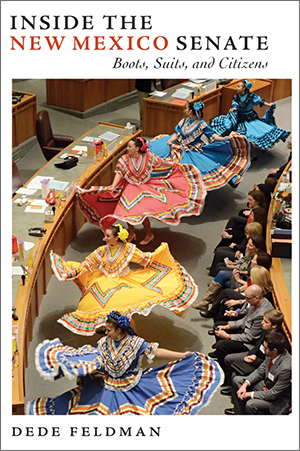
This week we asked former state senator and author Dede Feldman some questions about her 16 years in the Senate, the future of New Mexico politics, and about her new book Inside the New Mexico Senate: Boots, Suits, and Citizens from UNM Press, 2014.
NMM: So many people love this book, the Mercury included, we wondered if you had any new insights away from the job into the essential method and madness of the New Mexico Legislature?
 I got a chuckle this week when Rep. Moe Maestas, majority whip in the NM House, told Albuquerque Journal columnist Thom Cole that the NM legislature was “way more mature than in Washington.” The comment came in reaction to a Chicago study printed in the Washington Post that cited the NM legislature as one of the most partisan in the country, even ahead of Wisconsin and Arizona. Mo and I agree, I think, that the NM legislature has often risen to the bipartisan occasion to pass things that might send Republicans through the roof in other states like a mental health parity, legalization of medical marijuana, needle exchange for drug addicts and a ban on the death penalty. This relative lack of partisanship was indeed one of the central messages of Inside the New Mexico Senate, which explored how and why this was possible in a purple state with a mix of rural and urban factions. But mature, really? Maybe Moe was thinking of the House, but in the Senate, we had more fun, with potato songs, senators in costume (including myself), live chickens, snakes, renewal of wedding vows, and much more.
I got a chuckle this week when Rep. Moe Maestas, majority whip in the NM House, told Albuquerque Journal columnist Thom Cole that the NM legislature was “way more mature than in Washington.” The comment came in reaction to a Chicago study printed in the Washington Post that cited the NM legislature as one of the most partisan in the country, even ahead of Wisconsin and Arizona. Mo and I agree, I think, that the NM legislature has often risen to the bipartisan occasion to pass things that might send Republicans through the roof in other states like a mental health parity, legalization of medical marijuana, needle exchange for drug addicts and a ban on the death penalty. This relative lack of partisanship was indeed one of the central messages of Inside the New Mexico Senate, which explored how and why this was possible in a purple state with a mix of rural and urban factions. But mature, really? Maybe Moe was thinking of the House, but in the Senate, we had more fun, with potato songs, senators in costume (including myself), live chickens, snakes, renewal of wedding vows, and much more.
NMM: We wondered what kind of traction in the market place the book has gotten, and what were the funniest and juiciest responses you’ve received.
The first printing sold out, and UNM Press ordered more, so I guess it’s gotten some traction within a certain niche. One of the quotes in the book from the late Gov. David Cargo is that New Mexicans love politics and hate government—so maybe I’m fulfilling this niche’s desires!
One of the reviewers on Amazon called the book, “Brutal, biting and hilarious,” and went onto say that it made sausage making look appealing! An email I got from a former constituent said that “it was a crisp, down home peek at what happens in that secretive public body that pulls the political strings between crunching chicharrones and naps.”
 My favorite reaction was from a young woman attending a bi-partisan seminar about running for office at which I spoke this spring. She was so enamored with the chapter on running for office that she got all her friends to read it and--completely unsolicited-- sent a photo of two political science students looking at the book in their graduation robes. I really wrote the book for folks like her-- to give young reformers, advocates and candidates some sense of what is successful and what is not. It’s all grist for the mill. So that’s been gratifying.
My favorite reaction was from a young woman attending a bi-partisan seminar about running for office at which I spoke this spring. She was so enamored with the chapter on running for office that she got all her friends to read it and--completely unsolicited-- sent a photo of two political science students looking at the book in their graduation robes. I really wrote the book for folks like her-- to give young reformers, advocates and candidates some sense of what is successful and what is not. It’s all grist for the mill. So that’s been gratifying.
NMM: Steve Terrell of the Santa Fe New Mexican has reminded us in his blog of how few governors have actually serviced much time in the Legislature, former House Speaker and Governor Bruce King not included. Given your sense of historical perspective, why do you think it is so difficult for legislators to run for governor?
Legislators tend to get puffed up about themselves when they are in session. Attendants, lobbyists, staff and assorted hangers-on are there to provide free meals, take your jacket to the dry cleaners, sharpen your pencil and thank you profusely for things you should have done anyway. Sometimes, not always, it goes to the head. With important decisions made on a daily basis, the temporary media spotlight, the constituent calls and letters, legislators often think they are better known statewide than they really are. And they forget that the approval rating for most legislatures ranges from about 19-45% (in a good year). Legislators may be popular with the party regulars who follow their legislative doings (and that can translate into victory at a pre-primary convention), but statewide office holders like the Governor or the AG have a much more solid media platform to stand on and, except for the Governor, are positioned to solicit the all-important contributions year round, without that troublesome ban on contributions during legislative sessions.
NMM: If Susana Martinez wins a second term, what do you think the most pressing issues facing New Mexico will be in the next four years? Would they be the same if Gary King were to be elected? And if not, what would be the major issues facing him?
The dismal state of New Mexico’s economy will be the top issue facing whoever is the next governor. It’s the root of our last place standing in almost every measure from child wellbeing to health disparities. Education will continue to be gridlocked if Martinez is re-elected, with teachers, counselors on the verge of open rebellion. Both candidates bear some responsibility when it comes to the behavioral health fiasco, and I don’t expect either can dig out of it rapidly. Lots of damage has already been done.
NMM: One of the most fascinating parts of your book is entitled “Good People Trapped in a Flawed System: Ethics, Campaign Finance, and Transparency.” Over the next four years, what are the major steps that the Legislature needs to take to advance its bipartisan efforts for high ethical standards, transparency, and finance reform?
Here’s what I believe are practical steps that can be taken right now:
- Establish an independent ethics commission
- Fix the public financing program for the judiciary and PRC to enable the participation of more small donors and meet constitutional standards
- Require accountability for independent expenditures, starting with a definition of what is “coordinated and what is not.
- Enact more lobbyist disclosure measures to reveal exactly what bills lobbyists are talking about when they spend money to entertain lawmakers and prevent them from being fundraisers for candidates.
Inside the New Mexico Senate is available at bookstores or directly from the University of New Mexico Press at www.unmpress.com or 800.249.7737.

June 12, 2014